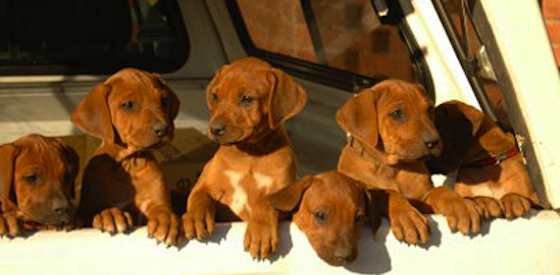- MENU
- HOME
- SEARCH
- WORLD
- MAIN
- AFRICA
- ASIA
- BALKANS
- EUROPE
- LATIN AMERICA
- MIDDLE EAST
- United Kingdom
- United States
- Argentina
- Australia
- Austria
- Benelux
- Brazil
- Canada
- China
- France
- Germany
- Greece
- Hungary
- India
- Indonesia
- Ireland
- Israel
- Italy
- Japan
- Korea
- Mexico
- New Zealand
- Pakistan
- Philippines
- Poland
- Russia
- South Africa
- Spain
- Taiwan
- Turkey
- USA
- BUSINESS
- WEALTH
- STOCKS
- TECH
- HEALTH
- LIFESTYLE
- ENTERTAINMENT
- SPORTS
- RSS
- iHaveNet.com: Pets
by Sandy Reynolds

Once you know what breed of dog you want, finding a good, reputable breeder is essential. The major issue for future dog owners is avoiding puppy mills. Thanks to heightened awareness, many people are now aware of the damage puppy mills can create: overbreeding, poorly socialized pups and increased genetic defects, among other problems. So when you talk to your potential breeder, you want to ensure that the puppies came from legitimate family lines and were bred responsibly.
Pay Attention to the Parents
The best way to get the most information about your potential pup is to see his parents with your own eyes. A reputable breeder will have the parents -- at least one of them. (They might have paid for the services of a sire that's at a different location.) If you can't see the parents, you won't know what your dog will end up like. Here are some things to look for when you observe the parents:
Check their size.
The parents are the best predictors of how big your dog will get.
Observe their temperaments.
Are they friendly and nonaggressive? Do they appear hearty and healthy? The naked eye can tell you a lot.
Watch how they walk.
An uneven gait could signify hip problems.
Ask the breeder for both parents' health certifications.
Dogs that weigh more than 50 pounds need hip certifications, and various other certifications are recommended for specific breeds.
Evaluate the Puppy
When you observe the puppy, there are some important things to look for:
Call the puppy to you.
If he comes readily and does not run away, he's been well-socialized.
Observe how well he gets along with his littermates.
Pay attention to his coat.
A shiny coat means good nutrition.
Ask These Questions
In addition to gathering information about the parents, ask the breeder:
How long have you been breeding?
You preferably want a breeder with more than 10 years of experience.
What are the strengths and weaknesses of the bloodlines, and how have you tested to offset that?
Different breeds have tendencies toward certain congenital defects. You want to know if these defects have shown up in the parents and prior generations. You also want to know if the breed's strengths have been displayed in the puppy's bloodlines.
Where was the litter whelped?
Make sure the puppies were whelped inside, where they had human contact from day one.
What shots has the puppy received?
Has the puppy been dewormed?
What are the differences of the temperaments among the puppies in the litter?
How old do the puppies have to be before you let them go?
For most dogs, adoption at 8 weeks is standard, but sometimes smaller breeds need more time.
What kind of guarantee can you offer should a problem arise?
Sandy Reynolds owner of Plantation Delight Kennel in West Grove, Penn., has been breeding dogs for more than 20 years. Also a social worker, Sandy often brings her dogs to work with clients.
Available at Amazon.com:
AUTOS | HOBBIES | EDUCATION | FAMILY | FASHION | FOOD & RECIPES | HOME DECOR | RELATIONSHIPS | PARENTING | PETS | TRAVEL | WOMEN
PET STORIES and PET ARTICLES ...
- Is Your Dog Cut out for Field Trials?
- Should You Crate-train Your Puppy?
- How to Play Soccer With Your Dog
- The Best Way for Your Dog to Ride in the Car with You
- Good Dog Park Etiquette
- What Is Freestyle Dancing With Dogs?
- Canicross: An Easier Way to Run With Your Dog
- Reading Your Dog's Body Language
- Kitten Kindergarten
- Tips to Keep Your Dog Safe While Flying
- Keep Your Dog Warm in the Winter
- Scottish Deerhound: The Ideal Exercise Buddy
- Teach Your Dog to Fetch
- Is Your Dog Bored?
- 7 Ways to Pamper Your Cat
- The Best Games to Play With Your High-Energy Dog
- Dog Feeding Mishaps Corrected
- How to Succeed at Off-Leash Dog Play
- ID Your Relationship With Your Cat
- Photographing Your Elusive Feline
- How to Keep Your Pet Safe During the Holidays
- When Good Dogs Turn Bad
- From Finicky Fido to Chowhound Charlie
- Insure Your Kitty's Health
- Unconditional Love: My Cat Forgives Me Every Day
- From Feline to Family Member
- Is Water From a Christmas Tree Stand Harmful to Cats?
- A Day in the Life of a Sheepherding Dog
- Go on a Desert Retreat With Your Dog
- Dog Food Goes Natural and Holistic
- Determining a Food Allergy
- Exercise Gone to the Dogs
- Find the Right Sport for Your Dog
- Make Your Dog a Part of Your Wedding
- Hydrotherapy Helps Dogs Get in Shape
- How Your Cat Says 'I Love You'
- Lost Cats Found
- De-stress Veterinary Visits for Your Cat
- Keeping Cat Food Fresh
- Second-Hand Cat, First-Rate Pet
Copyright ©
Pets | Dogs: What to Ask a Dog Breeder